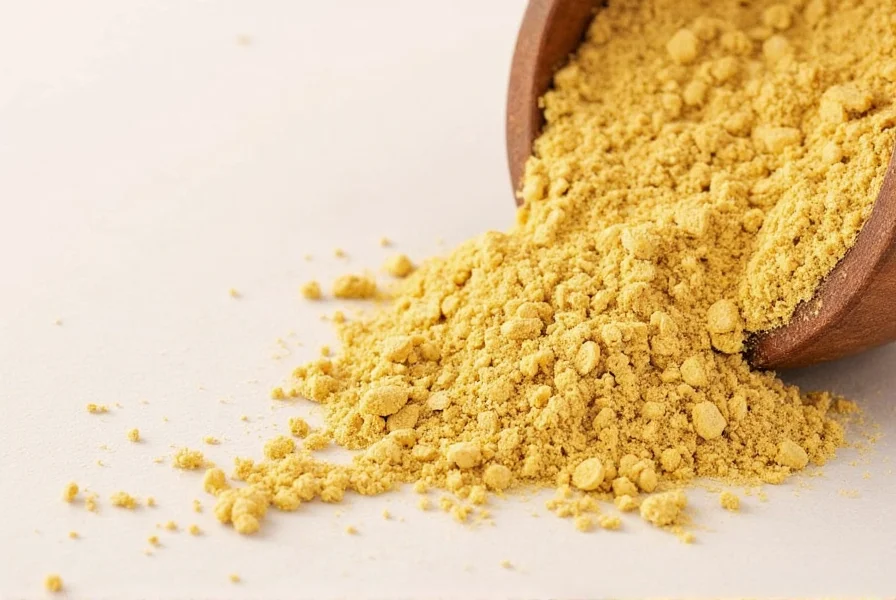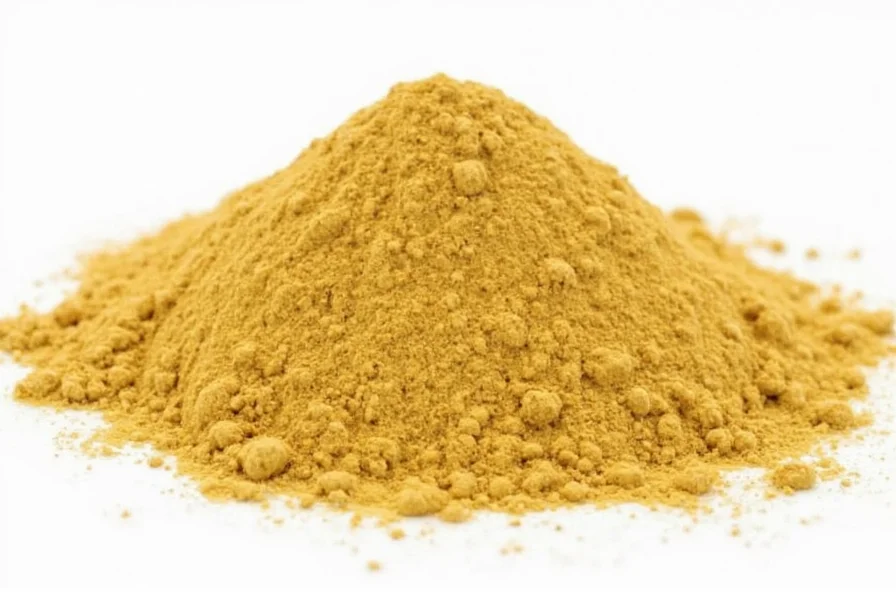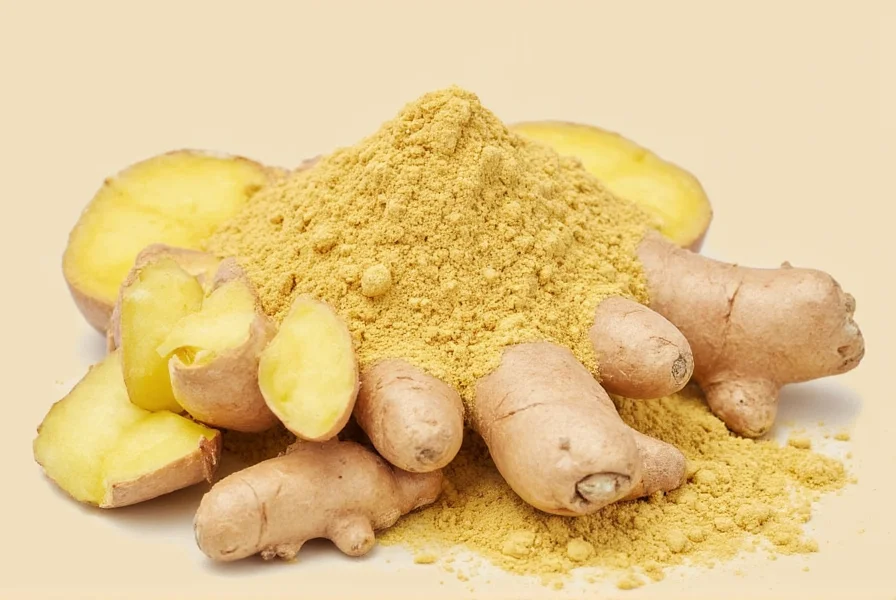Ginger powder transforms the rhizome of the Zingiber officinale plant into a convenient, shelf-stable spice through careful dehydration and grinding. This process concentrates ginger's bioactive compounds while removing moisture that would otherwise cause spoilage. The resulting fine powder maintains ginger's distinctive warm, pungent flavor profile in a form that's easier to store and measure than its fresh counterpart.
What Exactly Is Ginger Powder?
Ginger powder begins as mature ginger roots harvested after 8-10 months of growth. Producers wash, peel, and thinly slice the rhizomes before dehydrating them at low temperatures (typically 50-60°C) to preserve volatile compounds. The completely dried ginger becomes brittle enough to grind into a fine powder that passes through 80-mesh sieves. This meticulous process ensures maximum retention of gingerols—the primary bioactive compounds responsible for ginger's characteristic heat and potential health properties.
Compared to fresh ginger, powder offers several distinct characteristics:
| Characteristic | Ginger Powder | Fresh Ginger |
|---|---|---|
| Flavor Intensity | More concentrated, slightly sweeter | Fresher, brighter, with citrus notes |
| Moisture Content | Nearly 0% | Approximately 80% |
| Shelf Life | 2-3 years when properly stored | 2-3 weeks refrigerated |
| Gingerol Content | Higher concentration per volume | Diluted by water content |
Culinary Applications and Substitution Guidelines
Chefs and home cooks value ginger powder for its consistent flavor and ease of incorporation into dry mixtures. It excels in applications where fresh ginger would introduce unwanted moisture:
- Baking: Essential in gingerbread, spice cakes, and cookies where liquid balance matters
- Dry Rubs: Blends seamlessly with other spices for meats and vegetables
- Curry Powders: Provides foundational warmth in spice blends
- Teas and Beverages: Dissolves completely without residue
- Preserves: Won't dilute jams and chutneys
When substituting between forms, remember these evidence-based ratios:
- 1 tablespoon fresh grated ginger = 1/4 teaspoon ginger powder
- 1 inch fresh ginger knob (about 15g) = 1/2 teaspoon powder
- For medicinal applications, consult research on equivalent dosages as absorption differs

Scientifically Supported Health Benefits
Research indicates ginger powder may offer several health advantages, primarily due to its concentrated gingerol content. A comprehensive 2020 review in Nutrients analyzed 109 studies on ginger's effects, revealing:
- Nausea Relief: Multiple clinical trials show 1-1.5g daily of ginger powder significantly reduces pregnancy-related, chemotherapy-induced, and motion sickness nausea
- Anti-Inflammatory Effects: Gingerols inhibit inflammatory pathways, with studies showing reduced muscle pain after exercise when consuming 2g daily
- Digestive Support: Accelerates gastric emptying by approximately 25% according to research in European Journal of Gastroenterology & Hepatology
- Antioxidant Capacity: ORAC testing shows dried ginger maintains significant antioxidant activity despite processing
It's important to note that while promising, many studies use standardized extracts rather than culinary-grade powder. The actual concentration of active compounds varies between commercial products based on growing conditions and processing methods.
Selection, Storage, and Quality Indicators
Choosing high-quality ginger powder ensures maximum flavor and potential benefits. Look for these indicators of premium product:
- Bright golden-yellow color (dull brown indicates age or poor processing)
- Strong, clean aroma without mustiness
- Fine, uniform texture without clumps
- Packaged in opaque containers to prevent light degradation
- Harvest date or "best by" date within 12-18 months
Proper storage maintains potency:
- Keep in airtight glass container away from light and heat
- Ideal storage temperature below 20°C (68°F)
- Refrigeration extends shelf life but requires careful moisture control
- Test freshness by rubbing between fingers—if aroma is weak, it's time to replace
Creating Homemade Ginger Powder
Making your own ginger powder guarantees freshness and avoids potential additives. Follow this evidence-based method for optimal results:
- Select firm, smooth ginger roots with tight skin (avoid shriveled or moldy specimens)
- Peel and slice into 1/8-inch thick pieces using a ceramic knife to prevent oxidation
- Blanch slices in boiling water for 30 seconds to deactivate enzymes
- Dehydrate at 57°C (135°F) for 8-12 hours until brittle
- Grind in spice grinder until passing through 80-mesh sieve
- Store immediately in dark glass container with oxygen absorber

Homemade powder typically contains 20-30% more gingerols than commercial products due to minimal processing time between harvest and dehydration. However, it requires proper drying technique—under-dried ginger risks mold growth while over-dried ginger loses volatile compounds.
Considerations and Potential Interactions
While generally recognized as safe, ginger powder warrants consideration in certain situations:
- May interact with blood-thinning medications (warfarin, aspirin) due to mild anticoagulant properties
- Gastric surgery patients should consult physicians before therapeutic use
- Those with gallstones should use cautiously as ginger may increase bile production
- Therapeutic doses (over 4g daily) may cause heartburn in sensitive individuals
The European Medicines Agency recommends not exceeding 4g daily of ginger powder for adults. Pregnant women should consult healthcare providers before using ginger medicinally, though culinary amounts (up to 1g daily) are generally considered safe.
Frequently Asked Questions
Is ginger powder as healthy as fresh ginger?
Ginger powder contains higher concentrations of certain compounds like gingerols per volume due to moisture removal, but loses some volatile compounds during drying. Research shows dried ginger maintains significant antioxidant and anti-inflammatory properties, though fresh ginger contains additional enzymes and moisture-soluble compounds. For most culinary uses, both forms offer comparable benefits when used appropriately.
How much ginger powder equals fresh ginger in recipes?
The standard substitution ratio is 1/4 teaspoon of ginger powder for every 1 tablespoon of fresh grated ginger. This accounts for the concentration difference from removing moisture. For precise culinary applications, use 1g of powder to replace 4g of fresh ginger by weight. Remember that powder has a slightly different flavor profile—more earthy and less bright—so adjustments may be needed for optimal results.
Can ginger powder help with nausea and morning sickness?
Clinical research supports ginger powder's effectiveness for nausea relief. Multiple studies show that 1-1.5 grams of ginger powder daily significantly reduces pregnancy-related nausea, with effects noticeable within 4 days. The American College of Obstetricians and Gynecologists considers ginger (up to 1g daily) an acceptable non-pharmacological option for pregnancy nausea. Always consult your healthcare provider before using ginger therapeutically during pregnancy.
How long does ginger powder stay fresh and potent?
Properly stored ginger powder maintains optimal flavor and potency for 2-3 years. Store in an airtight container away from light, heat, and moisture—ideally in a dark cupboard at temperatures below 20°C (68°F). Signs of degradation include faded color (from bright yellow to dull brown), weak aroma, and clumping. For maximum health benefits, replace powder annually as bioactive compounds gradually degrade over time, even with proper storage.
What's the difference between organic and conventional ginger powder?
Organic ginger powder comes from ginger grown without synthetic pesticides, herbicides, or fertilizers, certified by recognized agencies. Research shows organic ginger may contain higher concentrations of certain antioxidants due to plant stress responses. Conventional ginger powder might have trace pesticide residues, though typically below safety thresholds. Both forms offer similar nutritional profiles, but organic options appeal to those minimizing chemical exposure. Processing methods affect quality more significantly than organic status—proper drying temperature preserves bioactive compounds regardless of farming method.











 浙公网安备
33010002000092号
浙公网安备
33010002000092号 浙B2-20120091-4
浙B2-20120091-4